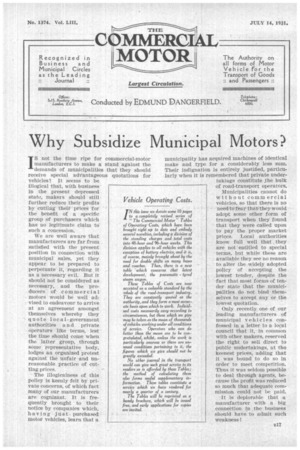Why Subsidize Municipal Motors?
Page 35

If you've noticed an error in this article please click here to report it so we can fix it.
IS not the time ripe for commercial-motor manufacturers to make a stand against the demands of municipalities that they should receive special advantageous quotations for vehicles? It seems to be illogical that, with business In the present depressed state, makers should still • further reduce their profits by cutting their priceS for the benefit of a specific group of purchasers which has no legitimate claim to such a concession.
We are well aware that manufacturers are far from satisfied with the . present position in connection with municipal sales, yet they appear to be prepared to perpetuateit, _regarding it as a necessary evil. But it should not be considered as necessary, and the producers of commercial • motors would be well advised to endeavour to arrive at an agreement amongst themselves whereby they • quote localgovernment authorities an d private . Operators like terms, lest the time should come when the latter group, through some representative body, lodges an organized protest against the unfair and unreasonable practice of cutting prices.
The illogicalness of this Policy is keenly felt by private concerns, of which fact many of our manufacturers are cognizant. It is frequently brought to their notice by companies which, ha ving .jtis t.• purchased motor vehicles, learn that a municipality has acquired machines of identical make and type for a considerably less sum. Their indignation is entirely justified, particularly when it is remembered that private under takings constitute the bulk of road-transport operators.
Municipalities cannot do without comm ercial vehicles, so that there is no 'need to fear--that:they would adopt some other form of transport when they found that they were called upon to pay the proper market prices. Local authorities know full well that they are not -entitled to special terms, but while these are available they see no reason to alter the widely adopted policy of accepting the lowest tender, .,despite the fact that most forms of tender state that the municipalities do not bind themselves to accept any or the lowest quotation.
Only recently: one of our leading manufacturers of municipal vehicles confessed in. n letter to a local council. that it, in common with other makers, reserved the right to sell direct to public undertakings, at the keenest prices, adding that it was bound to do so in order to meet competition. Thus it was seldom possible to deal through agents, because the profit was reduced so much that adequate commission could not be paid.
It is deplorable that a manufacturer with a big connection in thebusiness should have to admit such weakness I




































































































